PALLADIUM May Again Become The Most Precious Metal
Commodities / Palladium Jul 16, 2011 - 06:17 AM GMTBy: I_M_Vronsky
 (In 2001 palladium reached $1,080/oz when gold was only $300/oz and platinum $715)
(In 2001 palladium reached $1,080/oz when gold was only $300/oz and platinum $715)
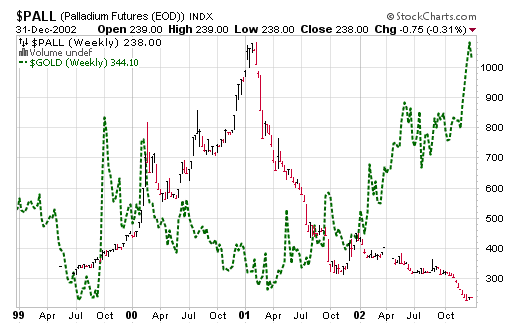
Three factors will help fuel palladium to surpass its 2001 high�and well beyond:
China Auto Production, the looming palladium Supply Deficit and the exemplary success of the newly created Palladium/Platinum ETFs.
CHINA'S AUTO PRODUCTION
The growth of automobile production in China has been spectacular, as shown by the following graph.
China's Automobile Production
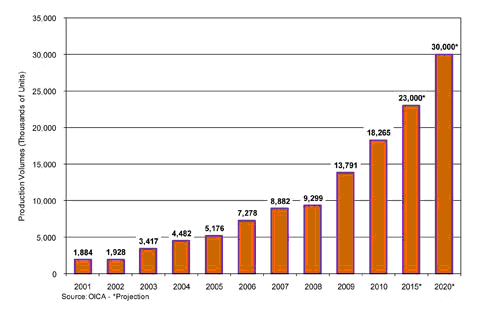
http://blogs-images.forbes.com/china/files/2011/05/Chart1.jpg
Such an impressive growth in output has been achieved largely through establishing of a number of joint ventures with Volkswagen, General Motors, and others. While the initial approach was to bring in key subsystems such as engines and transmissions from foreign companies, the present emphasis is on building up the supply chains in China.
The industrial and political decisions by China to date in building an automobile industry have been excellent. The large crowds at the 14th Shanghai International Automobile Industry Exhibition demonstrates the enthusiasm in China for automobiles.
Automobiles Produced Per Month
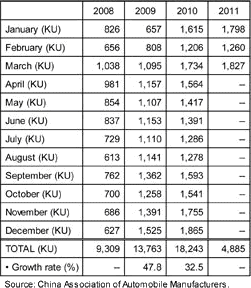
http://blogs-images.forbes.com/china/files/2011/05/Table.jpg
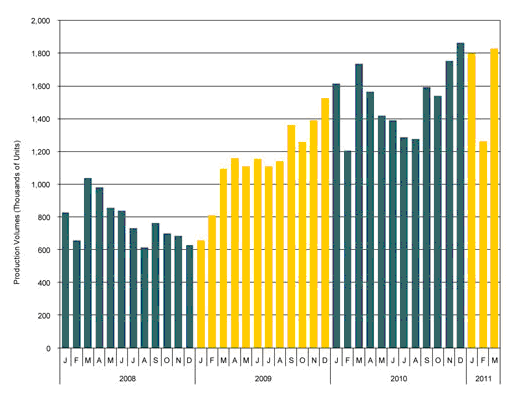
http://blogs-images.forbes.com/china/files/2011/05/Table_2.jpg
China has approximately 52 automobiles per 1,000 people, while the U.S. and Europe have approximately 457 automobiles per 1,000 people. The upside potential is large indeed.
China's auto production during the past five years is nothing short of spectacular. Specifically, motor vehicle production increased an average 44% per annum since 2005 vis-�-vis total world production increasing only 3% per year in the same time period.
China is expected to produce 20 million vehicles in 2011. However, China is building its manufacturing base for 30 million automobiles in 2020.
INCREASED AUTO DEMAND
The Detroit branch of Boston Consulting Group predicts that by 2014, one-third of world demand will be in the four BRIC markets (Brazil, Russia, India and China). Other potentially powerful automotive markets are Iran and Indonesia.
This is a list of countries by motor vehicle production based on OICA accessed in April 2011. Figures include passenger cars, light commercial vehicles, minibuses, trucks, buses and coaches.

http://en.wikipedia.org/wiki/List_of_countries_by_motor_vehicle_production
http://en.wikipedia.org/wiki/Automotive_industry
Also known as the "poor man's platinum," demand for palladium for jewelry in China has been soaring with the growth of the middle class. On top of this, you can add demand from the new palladium ETF (PALL), which ALREADY has more than $1 BILLION of the metal - and going forward will soak up a hefty 10% of the world's yearly palladium production.
For the most part, palladium demand is generally correlated to the health of the global auto industry, which has strongly rebounded this year.
Vehicle sales in every one of the top ten auto markets in the world are increasing:
- The U.S. auto market, where sales have climbed 8.4% in the first eight months of 2010 to almost 7.7 million units.
- China, the largest car market in the world, increased auto sales by 39.0% in the January-August 2010 period to 11.6 million units.
- Domestic monthly sales of new cars, trucks, and buses in Japan, the world's #3 auto market, increased 46.7% in August 2010 from a year earlier - the highest monthly gain since 1972. This was the 13th straight month of increased auto sales in the country.
Overall, global light vehicle production is expected to increase 60% through 2016. Take a look:
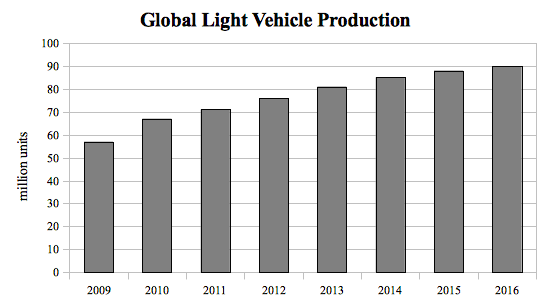
http://images.angelpub.com/2010/37/5864/global-light-vehicle-production-2009-2016.png
2011 Palladium Demand vs Supply
About 80 million vehicles will be produced in 2011 (this includes Light Vehicles, buses, RV's and other large vehicles). On average each car's catalytic converter requires about 1/20th of a troy ounce of palladium and/or platinum. And in light of the material price difference (ie platinum costs 124% more than palladium - $1735 vs $776), it is reasonable to assume automobile manufactures will elect to use cheaper palladium).
Platinum & Palladium Demand per Johnson Matthey
http://www.platinum.matthey.com/news-archive/platinum-2011-the-platinum-market-was-close-to-balance-in-2010/800534481.html
New Palladium/Platinum Demand from 10 newly created ETFs:
http://etf.stock-encyclopedia.com/category/platinum-palladium-etfs.html
In just one of these new pure palladium ETFs (symbol: PALL), it has already over $1 Billion in assets. At the average price in 2011 that represents about 1.3 million oz of palladium, which was taken off the market - thus reducing supply.
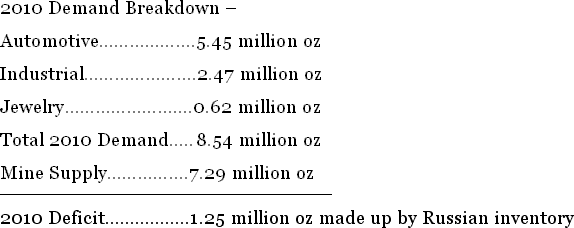
Estimated 2011 Demand
This year's total palladium demand is expected to increase by at least 35% due to :
- Increased auto production mostly from Asia,
- Continued explosive growth of 10 palladium/platinum ETFs, and
- Greatly increased investment demand attracted by rapidly rising prices. Consequently, expected global palladium demand should top 11.53 million oz in 2011.
However, mine supply is expected to remain stable at about 7.29 million oz. Obviously, this will reveal a supply deficit of 3.73 million oz:
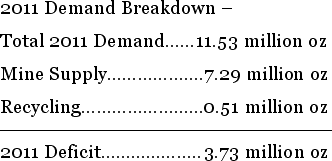
Not surprisingly, the heretofore Russian palladium inventory has been exhausted. Therefore, the material 3.73 million oz Supply Deficit will inevitably propel the price of palladium into orbit during the next 12-15 months as industrial shortages are perceived.
U.S. Palladium Bullion Coin OK'd
America is getting a new coin - a $25 face value palladium bullion coin with a Mercury-head design and a weight of 1 ounce.
The bill authorizing the coin passed the House on September 29, 2010 and was approved unanimously by the Senate on November 30, 2010. Then, in an unusual move, it was cleared the same day for the White House.
President Obama's signature is all that is needed for the measure to become law.
CONCLUSION
Global total palladium demand is comprised of the following: Automotive, Industrial (computers, dental, etc), Jewelry, Investment (coins and bullion), and 10 newly created ETFs (which promise to take a giant share in the future). Additionally, the US Mint is planning to issue a Palladium Eagle coin, which will surely be a substantial demand source.
On the supply side is yearly flat mine production and small secondary recovery (ie recycling) processes. As mentioned previously Russian inventory is all but depleted.
How high and how fast the palladium price will inevitably increase is a function of the following:
- Global growth of the automotive industry - especially in China & India
- Accelerating supply deficits
- Emerging ETF demand
- Growth of investment demand fostered by rising prices
- Exploding inflationary environment in the US and BRIC nations
- Market speculators via Futures and/or Options
FORECAST PALLADIUM PRICE
Other Investment Factors In Determining The Ultimate Price of Palladium
- Central Banks buying palladium in addition to gold for their Foreign Reserves diversification
- Threat of impending Worldwide Currency Devaluation Contagion
- Palladium is 15 times more rare than platinum and 30 more rare than gold
- There is no real substitute for palladium, except platinum that is 124% more expensive today. Palladium has the highest melting point and is the lightest of the precious metals, which is eminently vital for industrial use
- Expected inflation to be generated by the US Fed in its effort to foster economic growth - in addition to helping President Obama be re-elected in November 2012.
- The value of the US Dollar Index vis-�-vis the Euro
Based on all the above research, it is almost impossible to accurately forecast the ultimate high price for palladium. However, one might objectively expect palladium to reach $1,800 to $2,300/oz sometime in the next 12-15 months.
By I. M. Vronsky
Editor & Partner - Gold-Eagle
www.gold-eagle.com
© 2010 Copyright I. M. Vronsky - All Rights Reserved
Disclaimer: The above is a matter of opinion provided for general information purposes only and is not intended as investment advice. Information and analysis above are derived from sources and utilising methods believed to be reliable, but we cannot accept responsibility for any losses you may incur as a result of this analysis. Individuals should consult with their personal financial advisors.
© 2005-2022 http://www.MarketOracle.co.uk - The Market Oracle is a FREE Daily Financial Markets Analysis & Forecasting online publication.



